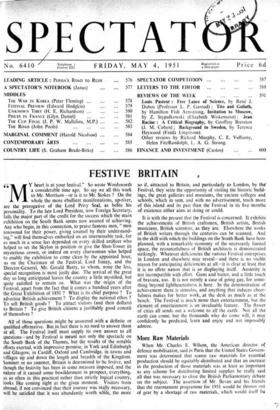FESTIVE BRITAIN Y heart is at your festival." So wrote
Wordsworth a considerable time ago. So say we all this week to Mr. Morrison—or is it to Mr. Stokes ? On the whole the more ebullient manifestations, up-river, are the prerogative of the Lord Privy Seal, as befits his personality. To the late Lord President, now Foreign Secretary, falls the major part of the credit for the success which the main exhibition on the South Bank seems now assured of achieving. Any who begin, in this connection, to praise famous men, " men renowned for their power, giving counsel by their understand- ing," will find themselves embarked on an interminable task, for as much in a sense has depended on every skilled artificer who helped to set the Skylon in position or give the Shot-Tower its mysterious crown, or indeed on every charwoman- who helped to enable the exhibition to come clean by the appointed hour, as on the Chairman of the Festival, Lord Ismay, and the Director-General, Mr. Gerald Barry. to whom, none the less, special recognition is most justly due. The arrival of the great day so long anticipated leaves the country a little mystified, but quite satisfied to remain so. What was the origin of the Festival, apart from the fact that it comes a hundred years after the Great Exhibition of 1851 ? What is its chief purpose ? To advertise British achievement ? To display the national ethos ? To sell British goods ? To attract visitors (and their dollars) to Britain ? To give British citizens a justifiably good conceit of themselves ?
All of those questions might be answered .with a definite or qualified affirmative. Butin fact there is no need to answer them at all. The Festival itself must supply its own answer to all questions—and by Festival is meant not only the spectacle on the South Bank of the Thames, but the results of the notable efforts exerted, with impressive promise. in York and Edinburgh and Glasgow, in Cardiff, Oxford and Cambridge, in towns and villlsges up and down the length and breadth of the Kingdom. Summer or no summer, Britain is determined to be festive, and though the festivity has been in some measure imposed, and the nature of it caused some bewilderment in prospect, everything, as so often in this practical rather than strictly logical country, looks like coming right at the given moment.. Visitors from abroad, if not convinced that their journey was redly necessary, will be satisfied that it was abundantly worth while, the more so if, attracted to Britain, and particularly to London, by the' Festival, they seize the opportunity of visiting the historic build- ings, the great galleries and museums, the ancient colleges and schools, which in sum, and with no advertisement, teach more of this island and its past than the Festival in its five months of existence either aims at doing or could.
It is with the present that the Festival is concerned. It exhibits the achievements of British craftsmen. British artists, British musicians, British scientists, as they are. Elsewhere the works of British writers through the centuries can be scanned. And in the skill with which the buildings on the South Bank have been planned, with a remarkable economy of the necessarily limited space, the resourcefulness of British architects is demonstrated strikingly. Whatever deficiencies the various Festival enterprises in London and elsewhere may reveal—and there is no visible reason for anticipating deficiencies at all—it is clear at least that it is no effete nation that is so displaying itself. Austerity is not incompatible with effort. Guns and butter, and a little touch of bravura, too. It is not merely a case of going gay, for some- thing beyond lightheartedness is here. In the demonstration of achievement there is stimulus, and anything that induces cheer- fulness makes for better work, at the desk as much as at the bench. The Festival is much more than entertainment, but the element of entertainment is an invaluable feature. The flower of cities all sends out a welcome to all the earth. Not all the earth can come, but the thousands who do come will, it may confidently be predicted, learn and enjoy and not impossibly admire.


































